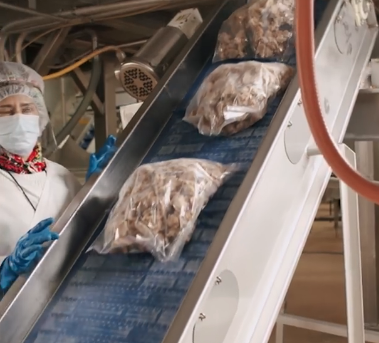
TOPEKA, Kan. (AP) — Kansas softened its quarantine guidelines for meatpacking plants after industry executives repeatedly pushed state officials to allow employees who were potentially exposed to the coronavirus to keep working, text messages and emails show.
The Kansas City Star reported that they obtained messages through an open records request showing that executives at Tyson and National Beef pushed Kansas Secretary of Agriculture Mike Beam to advocate more-lenient federal Centers for Disease Control and Prevention guidance.
Beam told The Associated Press on Wednesday that his role was to “emphasize internally” in Gov. Laura Kelly’s administration that there would be major problems with the nation’s food supply if the plants shut down. Beam worked for the Kansas Livestock Association for 38 years before becoming agriculture secretary in 2019.
“It was a balancing act, and I basically was feeding that into the mix,” he said.
The Star reported that in an April 20 text to Beam, National Beef Chief Operating Officer Terry Wilkerson noted that two meatpacking plants elsewhere in the U.S. were shutting down.
“The sooner we get the CDC new guidance in place the better,” he wrote.
Ruth Bradley, manager of state and local government relations at Tyson, texted Beam on April 15 saying that because of a higher rate of absenteeism among workers, Tyson wanted to follow CDC guidelines allowing workers without symptoms to still work if they wear a mask.

The Kansas Department of Health and Environment updated its guidelines on May 2 to allow meatpacking employees who have come into close contact with positive cases to stay on the job as long as they showed no symptoms and took precautions. It previously advised contacts to quarantine for two weeks.
Kansas, which processes more than a quarter of the nation’s beef, has had nearly 2,000 people infected with COVID-19 from outbreaks linked to the state’s meatpacking plants and six people have died. With the exception of a Johnsonville plant in Holton, large processors have stayed open in Kansas throughout the pandemic, although operating at a reduced capacity.
During a news conference Tuesday, Kelly pointed “proudly” to plants continuing to operate.
Beam wrote in an April 21 email to Will Lawrence, Kelly’s chief of staff, that it appeared Kansas Department of Health and Environment Secretary Lee Norman, who has been leading the state’s pandemic health response, was “not wanting to defer” to the less restrictive federal guidance.
Beam said he wanted Lawrence to know the issue was “brewing,” adding, “I sense National Beef, and others, would like to have a response fairly soon.”
Two days later, Beam texted meatpacking contacts that he would be calling “regarding a POSSIBLE path for letting close contacts return to work.”
Beam told the AP that his relationship with Norman remained “cordial” and that the health department changed its guidance after a CDC team physically reviewed Kansas plants. Beam said the final decision was the health department’s.
Health department spokeswoman Ashley Jones-Wisner said in a statement that before the new guidance was issued, conversations among her agency, the Department of Agriculture and the companies occurred regularly as the state tracked “how each plant was doing.”
President Donald Trump signed an executive order on April 28 directing meatpacking plants to stay open.
“Our concern was, and remains, public health protections within the parameters outlined by the federal government,” Jones-Wisner said.
National Beef Chief Financial Officer Simon McGee requested in an email to Beam that Kelly’s office speak to the union representing workers at the company’s Dodge City plant about the “special responsibility” of meatpacking employees.
Company spokesman Keith Welty said in a statement that the company’s focus throughout the pandemic has been protecting “the health, wellness and safety of our employees.”
Tyson spokeswoman Liz Croston said Tuesday that the company “will not ask anyone to work in our plants unless we are confident that it is safe.” She said correspondence with state officials “reflects our interest in the consistent application of federal safety guidance.”






